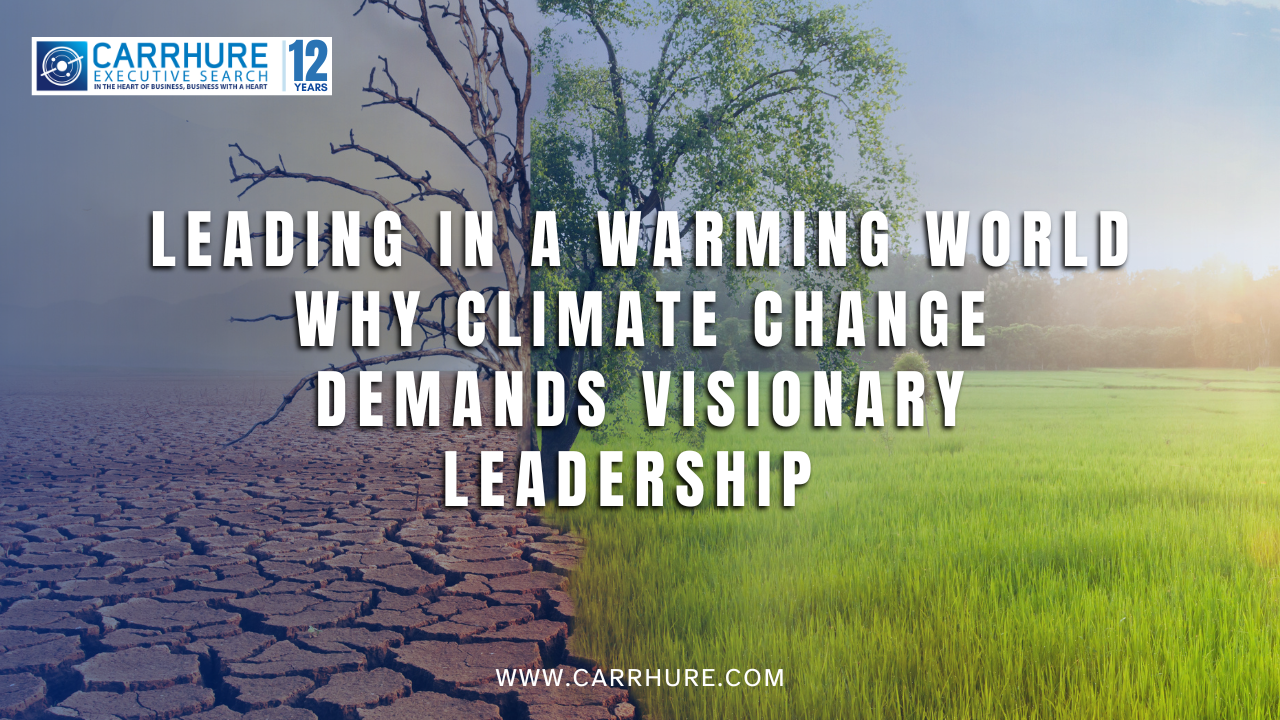Climate change is not just an environmental challenge; it is a global leadership test. It impacts economies, health systems, governance, infrastructure, food security, and human rights. Rising temperatures, extreme weather events, sea-level rise, biodiversity loss, and water scarcity are no longer future risks; they are present realities that require urgent, integrated, and visionary responses.
And while technology and policy play critical roles, it is leadership that determines how effectively we respond, how equitably we act, and how sustainably we move forward.
Climate Trends Leaders Cannot Ignore.
Recent data points to a rapidly worsening climate scenario:
2024: The Hottest Year on Record.
According to the World Meteorological Organization (WMO), global temperatures in 2024 reached 1.55 °C above pre-industrial levels, surpassing all previous records.
2025: Projected to Be Among the Top Three Warmest Years.
Carbon Brief estimates a 51% chance that 2025 will be the second-warmest year, and a 49% chance that it will be the third.
Breach of the 1.5 °C Threshold is Likely.
The WMO forecasts an 86% probability that at least one year between 2025 and 2029 will experience temporary warming exceeding 1.5 °C.
Clear Attribution to Human Activity
A major 2025 report from Earth System Science Data finds that 1.22 °C of observed warming over the past decade is attributable to human activities—particularly the burning of fossil fuels and deforestation.
Rising Sea Levels and Accelerating Risks
Sea levels have risen by 228 mm since 1901, with an increasing rate of acceleration. This poses a threat to coastal infrastructure, agriculture, and freshwater access.
These statistics are more than climate milestones; they are warning signals for leaders across sectors.
The Expanding Impacts of Climate Change
Climate change brings interconnected, global challenges that no leader can ignore:
- Agricultural Disruption: Droughts, heatwaves, and shifting rainfall patterns reduce yields and threaten food security.
- Water Stress: Melting glaciers and erratic rainfall endanger water supplies for agriculture, drinking, and sanitation.
- Biodiversity Loss: Ecosystems are collapsing, affecting food chains, pollination, and ecological resilience.
- Forced Migration: Sea-level rise, desertification, and climate-induced disasters displace millions.
- Public Health Strains: Heatwaves, poor air quality, and shifting disease vectors pose new challenges to healthcare systems.
- Infrastructure Risk: Cities and critical systems are increasingly vulnerable to floods, wildfires, and heat stress.
These challenges are not isolated; they are compounding. And they require leaders to think systemically, act decisively, and lead collaboratively.
The Role of Leadership in a Climate Crisis
At its core, leadership is about guiding people and institutions through complexity and change. Climate change intensifies that complexity; it introduces uncertainty, accelerates risk, and exposes the fragility of systems designed for a different era.
Leadership today must evolve from operational efficiency to transformational resilience.
Here’s what that means in practice:
- Vision and Clarity Amid Uncertainty
Leaders must offer a clear long-term vision that integrates climate reality. This includes setting priorities that account for environmental limits and social equity, framing sustainability not as a cost, but as a guiding principle.
- Courage to Make Difficult Decisions
Climate leadership often involves uncomfortable trade-offs. Phasing out fossil fuels, changing land-use practices, or reevaluating investments may be unpopular, but they are necessary. Courageous leaders make decisions for the benefit of future generations, not just quarterly results.
- Systems Thinking and Interconnected Solutions
Climate challenges span multiple sectors. Effective leadership means understanding and responding to these interdependencies; bridging gaps between policy, science, business, and communities.
- Ethical Leadership and Climate Justice
The effects of climate change are not evenly distributed across the globe. Those least responsible often suffer the most. Leaders must center justice in climate decisions, ensuring that adaptation and mitigation strategies are inclusive and equitable.
- Collaboration Across Sectors and Borders
No country, company, or organization can solve the climate crisis on its own. Effective leaders foster cross-sector and international collaboration by sharing data, innovation, resources, and responsibility.
Six Strategies for Climate-Conscious Leadership
To operationalize these leadership principles, the following strategies can be applied across sectors:
- Mainstream Climate Risk in Governance and Planning
- Integrate climate forecasting and risk assessments into all levels of decision-making, from national policies to corporate strategies and operations.
- Require climate stress testing in infrastructure, finance, health, and agriculture planning.
- Invest in Adaptation and Resilience
- Prioritize resilient infrastructure, early warning systems, regenerative agriculture, and nature-based solutions.
- Shift funding from reactive crisis management to proactive preparedness.
- Accelerate the Just Transition to Low-Carbon Economies
- Phase out fossil fuels responsibly while investing in renewable energy and green jobs.
- Support workers and communities through reskilling, education, and social protection.
- Enhance Climate Literacy and Public Engagement
- Empower teams, communities, and stakeholders with reliable, science-based information.
- Use clear and inclusive communication to build public support and accountability.
- Support Local Leadership and Indigenous Knowledge
- Elevate community-led adaptation projects and traditional ecological knowledge.
- Ensure participation from women, youth, and underrepresented groups in climate governance.
- Align Metrics and Accountability with Climate Goals
- Develop measurable targets tied to emissions reduction, biodiversity protection, and resilience outcomes.
- Link executive incentives, organizational performance, and investments to climate indicators.
Leadership That Shapes the Future
We are no longer preparing for climate change; we are living through it. The scale of the crisis can feel overwhelming, but it also provides clarity: we know what is happening and what needs to be done.
The challenge now is to lead in a way that is not only reactive but regenerative.
This is a defining moment for leadership. Not just for heads of state or CEOs, but for every decision-maker, manager, planner, educator, and advocate who influences the systems we rely on.
Leadership in a climate-impacted world must be:
- Grounded in science
- Driven by ethics
- Informed by community needs
- Focused on resilience, not just growth
The future will belong to the leaders who recognize that responding to climate change is not only a moral imperative, but the greatest opportunity of our time to redefine progress, rebuild resilience, and lead with purpose.
References
- United Nations News (2025). Global temperatures may break key 1.5 °C limit in next five years, UN weather agency warns.
https://news.un.org/en/story/2025/05/1163751 - World Meteorological Organization (2025). Global climate predictions show temperatures expected to remain or near record levels in coming 5 years.
https://wmo.int/news/media-centre/global-climate-predictions-show-temperatures-expected-remain-or-near-record-levels-coming-5-years - Carbon Brief (2025). State of the climate: 2025 on track to be second or third warmest year on record.
https://www.carbonbrief.org/state-of-the-climate-2025-on-track-to-be-second-or-third-warmest-year-on-record/ - Earth System Science Data (2025). Indicators of Global Climate Change 2024: annual update of key indicators of the state of the climate system and human influence.
https://essd.copernicus.org/articles/17/2641/2025/







